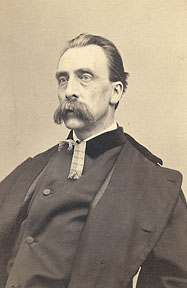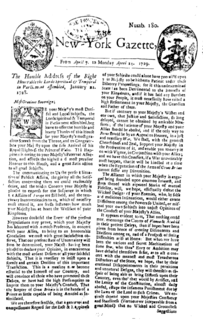
John Peter Zenger (October 26, 1697 – July 28, 1746) was a German printer and journalist in New York City. Zenger printed The New York Weekly Journal. He was accused of libel in 1734 by William Cosby, the royal governor of New York, but the jury acquitted Zenger, who became a symbol for freedom of the press.

Daniel Fowle was a colonial American printer and publisher before and during the American Revolution, and the founder of The New Hampshire Gazette. He printed Samuel Adams' newspaper, The Independent Advertiser. He was jailed for printing a damaging account on the conduct of various Massachusetts representatives and after his trial, he lost his license to print. Dismayed with the Massachusetts government he subsequently chose to remove from Massachusetts to New Hampshire and established The New Hampshire Gazette. During the course of his printing career Fowle employed several apprentices. Using his newspaper, he openly criticized the Stamp Act in 1765. After American independence was established he was commissioned to print the state laws of New Hampshire.
The Queensland Times is an online newspaper serving Ipswich and surrounds in Queensland, Australia. The newspaper is owned by News Corp Australia. The circulation of The Queensland Times is 10,804 Monday to Friday and 14,153 on Saturday.
The Columbian Centinel (1790–1840) was a Boston, Massachusetts, newspaper established by Benjamin Russell. It continued its predecessor, the Massachusetts Centinel and the Republican Journal, which Russell and partner William Warden had first issued on March 24, 1784. The paper was "the most influential and enterprising paper in Massachusetts after the Revolution." In the Federalist Era it was aligned with Federalist sentiment. Until c. 1800 its circulation was the largest in Boston, and its closest competitor was the anti-Federalist Independent Chronicle.
The 1790 and 1791 United States Senate elections were the second series of elections of senators in the United States. In these elections, terms were up for the nine senators in Class 1. As of these elections, formal organized political parties had yet to form in the United States, but two political factions were present: The coalition of senators who supported President George Washington's administration were known as the Pro-Administration Party, and the senators against him as the Anti-Administration Party.
Andrew Bent was a printer, publisher and newspaper proprietor, active in Australia.
Edmund Freeman (1764–1807) was a printer and publisher in Boston, Massachusetts, in the late 18th century. He published the Boston Magazine and the Herald of Freedom newspaper. He worked with Loring Andrews as "Freeman and Andrews, printers, State-Street, north side State-House." As editor of the Herald of Freedom, he was sued for libel in 1790 by Massachusetts legislator John Gardiner; Freeman won the case.
Edward Eveleth Powars was a printer in Boston and Worcester, Massachusetts, in the late 18th century. He published the Independent Chronicle (1776-ca.1779), the Boston Evening-Post (1781–1784), the American Herald (1784–1790), and The Argus. He worked with Nathaniel Willis as "Powars & Willis."

Frederic Hudson was a leading 19th century American newspaper editor, working from 1838 to 1866 for New York Herald, where he served as managing editor, and was influential in the development of American journalism.

The New York Evening Express (1836–1881) was a 19th-century American newspaper published in New York City.

The New-York Gazette (1725-1744) was the first newspaper published by William Bradford in the Province of New York.

Early American publishers and printers played a crucial role in the social, religious, political and commercial developments in colonial America, before, during and after the American Revolution. Printing and publishing in the 17th and 18th centuries among the Thirteen Colonies of British North America first emerged from religious enthusiasm and the need for bibles and other religious literature. By the mid 18th century printing took on new proportions with the newspapers that began to emerge. Many of them were outspoken about the British colonial government which was widely considered unfair among the colonists.

The Constitutional Courant was a single issue colonial American-newspaper published in response to the Stamp Act of 1765. It was printed by William Goddard under an assumed name of Andrew Marvel. The newspaper vociferously attacked the Stamp Act in strong language, which caught the attention of colonial printers and royal colonial officials alike. The Courant and its general message proved popular and the newspaper was soon reprinted in other major towns and distributed elsewhere among the colonies.







